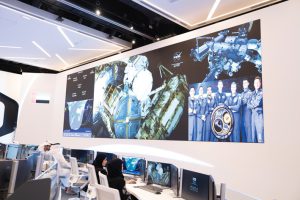DUBAI / WAM
The UAE Astronaut Programme is a sustainable programme that aims to develop a national team of astronauts to achieve the country’s aspirations in scientific exploration, participate in manned exploration missions, and contribute to the global space exploration missions by developing and preparing a team of Emirati astronauts, a top official told the Emirates News Agency (WAM).
Salem Humaid AlMarri, Director-General of the Mohammed bin Rashid Space Centre (MBRSC), pointed out that astronaut Sultan Al Neyadi is on the longest space mission in the Arab history, spanning six months, aboard the International Space Station (ISS). This mission has promoted the stature of the UAE and all Arabs, and exceeded all expectations. He added that with the return of Al Neyadi to Earth, the centre will study strategic plans to secure a seat on one of the space flights every 3 or 5 years.
AlMarri highlighted the many achievements of Al Neyadi during his mission as he recorded a new historic achievement as the first Arab to undertake a spacewalk during Expedition 69, venturing out of the ISS and completing his spacewalk, bearing the UAE flag and making the UAE the 10th country to perform a spacewalk on the ISS.
On the UAE’s ambitious space explorations, MBRSC Director-General explained that the UAE, as part of its ambitious UAE Astronaut Programme, has now four qualified astronauts, including Hazza al Mansouri and Sultan Al Neyadi. Noura Al Matrooshi and Muhammad Al Mulla have completed training at the Nasa’s Johnson Space Centre in Houston for future space flights.
About the Arab partnerships in space projects, he stressed that the UAE has many such partnerships with Bahrain and Kuwait, and discussions are on with Egypt and Saudi Arabia on training for building satellites. The UAE-Bahraini Light-1 CubeSat was successfully launched into orbit from the International Space Station in February this year. Preparations are going on to participate in future exploration missions to the moon through Rashid Rover 2, UAE’s second mission to the moon. Discussions with Kuwait on partnerships in various training programmes, and with other Arab countries on similar initiatives are also progressing, the official explained.
He also said that the MBRSC is preparing to receive Sultan Al Neyadi who will rerun from his mission after a few weeks. He will launch scientific and experimental programmes for the community to share his experiences.
AlMarri noted that centre is completing the construction of the “MBZ-SAT”, which is expected to be launched in mid-2024. It is the largest satellite in the centre’s history, and the most advanced in the region, offering high-resolution satellite images.
He confirmed that the new satellite was designed and manufactured by the Mohammed bin Rashid Space Centre with contributions of the UAE’s private sector.
The MBZ-SAT will be equipped with an automated system for arranging images round-the-clock, ensuring that it provides the highest quality standards of satellite images intended for commercial use globally.
This project will strengthen the UAE’s partnerships in the space industry between the public and private sectors. MBZ-SAT will contribute to meeting the growing commercial demand for high-resolution satellite images that will show details within an area of less than one square metre, which will be one of the most advanced features ever.
 The Gulf Time Newspaper One of the finest business newspapers in the UAE brought to you by our professional writers and editors.
The Gulf Time Newspaper One of the finest business newspapers in the UAE brought to you by our professional writers and editors.
